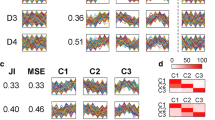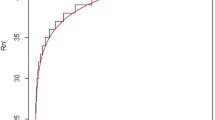Abstract
Within 0/1 data, co-clustering provides a collection of bi-clusters, i.e., linked clusters for both objects and Boolean properties. Beside the classical need for grouping quality optimization, one can also use user-defined constraints to capture subjective interestingness aspects and thus to improve bi-cluster relevancy. We consider the case of 0/1 data where at least one dimension is ordered, e.g., objects denotes time points, and we introduce co-clustering constrained by interval constraints. Exploiting such constraints during the intrinsically heuristic clustering process is challenging. We propose one major step in this direction where bi-clusters are computed from collections of local patterns. We provide an experimental validation on two temporal gene expression data sets.
Preview
Unable to display preview. Download preview PDF.
Similar content being viewed by others
References
Robardet, C., Feschet, F.: Efficient local search in conceptual clustering. In: Jantke, K.P., Shinohara, A. (eds.) DS 2001. LNCS (LNAI), vol. 2226, pp. 323–335. Springer, Heidelberg (2001)
Dhillon, I.S., Mallela, S., Modha, D.S.: Information-theoretic co-clustering. In: Proceedings ACM SIGKDD 2003, Washington, USA, pp. 89–98. ACM Press, New York (2003)
Ritschard, G., Zighed, D.A.: Simultaneous row and column partitioning: Evaluation of a heuristic. In: Zhong, N., Raś, Z.W., Tsumoto, S., Suzuki, E. (eds.) ISMIS 2003. LNCS (LNAI), vol. 2871, pp. 468–472. Springer, Heidelberg (2003)
Madeira, S.C., Oliveira, A.L.: Biclustering algorithms for biological data analysis: A survey. IEEE/ACM Trans. Comput. Biol. Bioinf. 1(1), 24–45 (2004)
Wagstaff, K., Cardie, C., Rogers, S., Schrödl, S.: Constrained k-means clustering with background knowledge. In: Proceedings ICML 2001, Williamstown, USA, pp. 577–584. Morgan Kaufmann, San Francisco (2001)
Klein, D., Kamvar, S.D., Manning, C.D.: From instance-level constraints to space-level constraints: Making the most of prior knowledge in data clustering. In: Proceedings ICML 2002, Sydney, Australia, pp. 307–314. Morgan Kaufmann, San Francisco (2002)
Davidson, I., Ravi, S.S.: Clustering with constraints: Feasibility issues and the k-means algorithm. In: Proceedings SIAM SDM 2005, Newport Beach, USA (2005)
Davidson, I., Ravi, S.S.: Agglomerative hierarchical clustering with constraints: Theoretical and empirical results. In: Jorge, A.M., Torgo, L., Brazdil, P.B., Camacho, R., Gama, J. (eds.) PKDD 2005. LNCS (LNAI), vol. 3721, pp. 59–70. Springer, Heidelberg (2005)
Pensa, R.G., Robardet, C., Boulicaut, J.-F.: A bi-clustering framework for categorical data. In: Jorge, A.M., Torgo, L., Brazdil, P.B., Camacho, R., Gama, J. (eds.) PKDD 2005. LNCS (LNAI), vol. 3721, pp. 643–650. Springer, Heidelberg (2005)
Sese, J., Kurokawa, Y., Monden, M., Kato, K., Morishita, S.: Constrained clusters of gene expression profiles with pathological features. Bioinformatics 20(17), 3137–3145 (2004)
Besson, J., Robardet, C., Boulicaut, J.-F., Rome, S.: Constraint-based concept mining and its application to microarray data analysis. Intelligent Data Analysis 9(1), 59–82 (2005)
Goodman, L.A., Kruskal, W.H.: Measures of association for cross classification. Journal of the American Statistical Association 49, 732–764 (1954)
Bozdech, Z., Llinás, M., Pulliam, B.L., Wong, E.D., Zhu, J., DeRisi, J.L.: The transcriptome of the intraerythrocytic developmental cycle of plasmodium falciparum. PLoS Biology 1(1), 1–16 (2003)
Arbeitman, M., Furlong, E., Imam, F., Johnson, E., Null, B., Baker, B., Krasnow, M., Scott, M., Davis, R., White, K.: Gene expression during the life cycle of drosophila melanogaster. Science 297, 2270–2275 (2002)
Becquet, C., Blachon, S., Jeudy, B., Boulicaut, J.-F., Gandrillon, O.: Strong association rule mining for large gene expression data analysis: a case study on human SAGE data. Genome Biology 12 (2002)
Author information
Authors and Affiliations
Editor information
Editors and Affiliations
Rights and permissions
Copyright information
© 2006 Springer-Verlag Berlin Heidelberg
About this paper
Cite this paper
Pensa, R.G., Robardet, C., Boulicaut, JF. (2006). Towards Constrained Co-clustering in Ordered 0/1 Data Sets. In: Esposito, F., Raś, Z.W., Malerba, D., Semeraro, G. (eds) Foundations of Intelligent Systems. ISMIS 2006. Lecture Notes in Computer Science(), vol 4203. Springer, Berlin, Heidelberg. https://doi.org/10.1007/11875604_49
Download citation
DOI: https://doi.org/10.1007/11875604_49
Publisher Name: Springer, Berlin, Heidelberg
Print ISBN: 978-3-540-45764-0
Online ISBN: 978-3-540-45766-4
eBook Packages: Computer ScienceComputer Science (R0)




